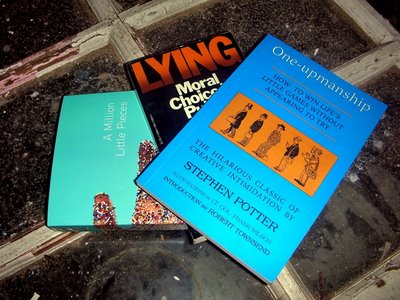2.3 Million Little Bucks

When I wrote about the James Frey controversy in January I ended the entry by observing, with some sarcasm, that there was talk of a possible class-action lawsuit, alleging fraud. There was one and apparently it has been settled. There you go.
The settlement reportedly calls for Frey and Random House to pay out no more than $2.35 million, which covers not only refunds but lawyers' fees and "an unspecified donation to charity." People who bought the "memoir" before the day the publisher acknowledged some of it was fiction would need to swear they thought it was a memoir and show proof that they bought and still owned it to be eligible for a full refund.
The "prove you own it" part is simple: for the hardcover, return page 163 and for the paperback, the cover. The "prove you bought it" part is nettlesome. It requires a receipt or "some other proof of purchase." They might decide just to accept affidavits.
So far, so good. But let's do some math, shall we?
According to Nielsen Media Research, quoted by Wikipedia, some 3.5 million copies of the book had been sold through May or thereabouts. About half were US sales. Using only the undiscounted paperback price for argument's sake (hardcovers were $23.95 but comparatively fewer are sold, and not many people pay the full jacket price anyway), Random House grossed $26 million in the US market alone (1,750,000 x 14.95 = 26,162,500). Add in the other half from overseas and conservatively call it a cool $50 million. The publisher's take is 60%: $30 million.
Frey's and Random House's exposure would be $2.35 million tops -- 8% of world gross (2,350,000 / 30,000,000 x 100 = 7.8%) -- again, using the best figures I can find. Let's say $850,000 goes for lawyer's fees and charity, leaving $1.5 million for actual refunds.
If only paperback buyers demand a refund -- to use an illustration that maximizes the number of disatisfied customers who could benefit from a fixed settlement fund -- then just a bit more than 100,000 refunds are possible (1,500,000 / 14.95 = 100,334). I'm not sure that the pre-January 26 sales figures are a matter of record, but "A Million Little Pieces" was a best seller long before the publisher revealed that parts of it were ficition, so I would expect the lion's share to be before. But let's stay conservative and say half of all US sales were before. That would be 3.5 million / 2 (US sales) / 2 (pre-acknowledgement) = 875,000.
Even if the "rebate effect" occurs -- something like 50% of rebates are unredeemed because people don't claim them, or don't follow instructions correctly -- Nearly 80% of the egible US poll wuold be disenfranchised -- (1.0 - (100,000 / (875,000 / 2))) x 100 = 77%).
So, the maximum exposure is about 8% of gross revenues and will almost certainly be a significantly smaller fraction of that. And a maximum of 6% of eligible fraud victims can be made whole (100,000 / 1,770,000 x 100 = 5.6%).
Neither Frey nor Random House admit any wrongdoing under the proposed settlement, as reported, though in a post-hoax editions"note to the reader" the author acknowledges making embellishments and alterations to factual events in his life.
Frey also stresses in the note that he believes " ... and I understand others strongly disagree, that memoir allows the writer to work from memory instead of from a strict journalistic or historical standard." I am not sure if Frey is saying he did the best he could from memory, without concern for fact-checking, because that standard is OK in the memoir genre, or that he made embelishments and alterations, as he also writes in the note, to enable "the stories in the book to ebb and flow, to have dramatic arcs, to have the tension that all great stories require."
It seems only one or the other is possible -- that he went with his best unchallenged recollections or that his best memory lacked sufficient punch, so he jazzed it up.
Either way, "A Million Little Pieces" is still ranked about 1,000 at Barnes & Noble.
Good deal!


Comments
http://www.wikihow.com/Dissuade-Yourself-from-Becoming-a-Blogger
-- you aren't a writer (writers have to maintain blogs. that is all there is to it).
-- you have nothing to say (then take a few days, weeks, months off)
but in the main, i totally agree. MSM makes far too much of the blogging phenomonon as it relates to useful information and still overreacts to things Internet. Witness the coverage of lonelygirl15. One look at one of the vids and it is clear that this is a high production-value enterprise that nobody should fall for, and yet the forensics of uncovering the latest Internet "hoax" is a big story in major newspapers and TV network news. And is this event even used as an opportunity to connect dots to the underlying issue, expectations about the veracity of citizen journalism? Ummm ...
But I digress. I think the rule is that nobody should blog except people that should.
Anyway, I appreciate your picking my blog to point to an article suggesting people resist the temptation to blog. thank you, very much :)